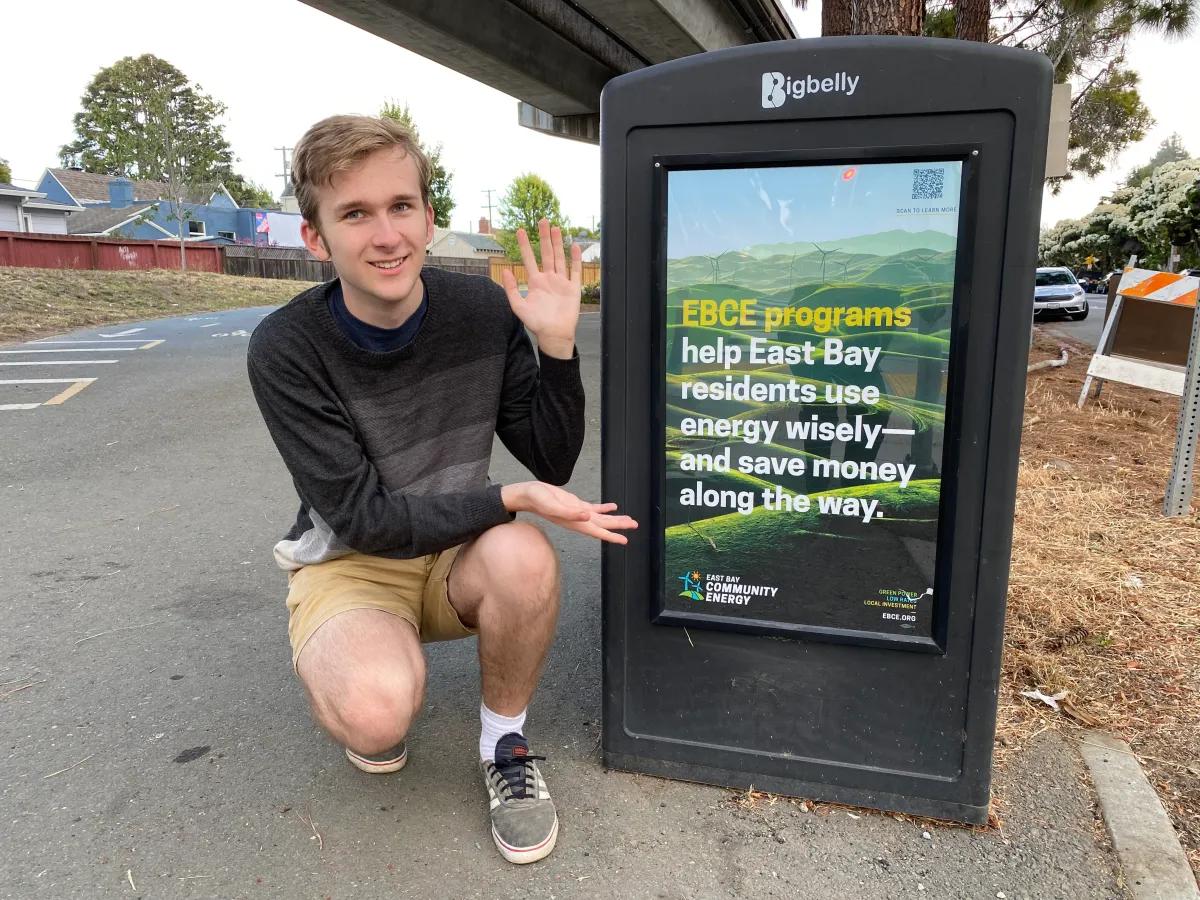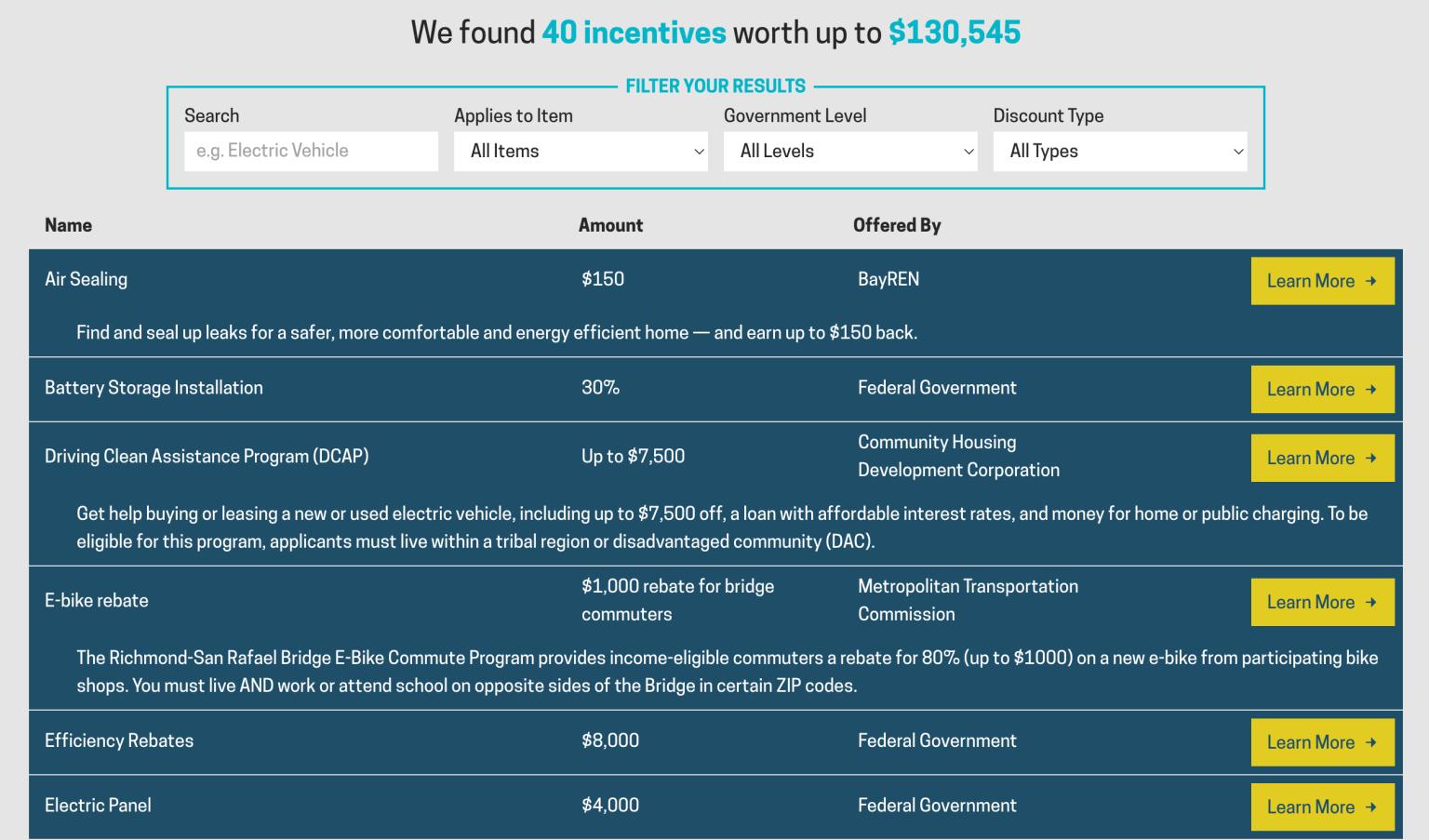Save on energy costs with this online tool designed by a Berkeley father and son
October 17, 2023
Source: by Iris Kwok in Berkeleyside
The new incentive finder, commissioned by East Bay Community Energy, can help East Bay residents save money on a heat pump, an electric vehicle and more.

Jerome Paulos, a Berkeley High alum who partnered with his dad to build an clean energy incentive finder for East Bay residents, poses next to an East Bay Community Energy advertisement on a garbage can. Courtesy: Ben Paulos
A father-son duo from Berkeley have created an online tool to help East Bay residents navigate the tangled maze of clean energy tax credits and rebates.
Jerome Paulos, a Berkeley High alum enrolled at college in Minnesota, spent this past summer working with his father, Ben Paulos, a clean energy consultant, to create the widget for the East Bay Community Energy website.

Ben Paulos poses for a headshot. Credit: Jessica Reich
In recent years, there’s been a “tidal wave” of funding meant to help residents make the switch to cleaner forms of energy, Ben Paulos said. But eligibility varies by location, income, housing status and more, and trying to figure out which credits you might qualify for can be a confusing ordeal.
The Paulos’ “incentive finder” database currently brings together 84 incentives from 27 different sources — including cities, counties, regional entities and state and federal programs – aimed at reducing the greenhouse gas emissions driving climate change. The tool provides a customized list of available incentives depending on users’ zip code, income, tax filing status, household size and whether they’re a homeowner or a renter.
“It’s really all about awareness,” Ben said. “Clean energy is on sale, and we need to tell the world that.”
The tool shows how a hypothetical West Berkeley homeowner making $50,000 per year could be eligible for up to 56 incentives (though many discounts can’t be combined). They could get, for example, a $5,500 rebate from the Bay Area Air Quality Management District to trade in their gas car for an electric vehicle. And they could receive a $8,000 rebate from the federal government to upgrade to an electric heat pump, which works as both an air conditioner and a heater. Users of the tool need to click a “Learn more” button attached to each incentive to be redirected to pages where they can see specific requirements and apply.

A screenshot of the Pauloses’ incentive finder. Credit: EBCE
The Pauloses took inspiration from Rewiring America’s IRA Savings Calculator, a tool that shows which federal tax credits and rebates you’re eligible for. (The IRA, or Inflation Reduction Act, signed into law by President Biden in August 2022, is a sweeping piece of climate legislation that includes $370 billion toward shifting the U.S. to cleaner forms of energy.)
As with the IRA Savings Calculator, most of the incentives highlighted by the Pauloses’ tool are related to green upgrades of people’s homes and transportation options. According to Berkeley’s annual greenhouse gas inventory, which counts emissions released within the city’s borders, transportation and residential gas are the two largest sources of greenhouse gas emissions.
There are currently no city of Berkeley-specific incentives laid out in the tool, though it does list the city of Albany’s offer of up to $2,000 in rebates for residents upgrading their HVAC system. Berkeley’s pilot e-bike program for low-income residents was not included, as the application period closed in March.
“The planet is telling us every day that climate change is happening now — fires, floods, hurricanes, heat waves,” Ben Paulos said. “While the state, federal and local governments are all starting to help out, a lot of that help will only be used if people are aware that they’re able to get thousands of dollars in tax credits or rebates if they switch to EVs, heat pumps.”
Stopping climate change has long been a mission for Paulos, a cyclist who found his calling working in energy and climate in the ’90s — a decade marked by the Gulf War and the Exxon Valdez oil spill. He also cites the 1990 Earth Day, which marked the 20th anniversary of the modern environmental movement, as a mobilizing moment.
Paulos, who was on the city’s energy commission between 2019 and 2022, currently writes a newsletter for EBCE on a contract basis and regularly works with Berkeley Lab and the Clean Energy States Alliance.
Paulos spent weeks collating incentives into a spreadsheet, while his son, Jerome, a former Berkeleyside web platform intern who has done coursework in computer science at Macalester College, was put in charge of making the complicated spreadsheet user-friendly by creating the custom tool.
They designed it with his 92-year-old mother, Maggie, in mind, Paulos said.
The Pauloses hope to eventually expand their incentive finder to other states and regions. Nothing’s been confirmed yet, but Ben Paulos said several other community choice energy providers, including Marin Clean Energy, have expressed interest.
“It’s not just a tool – it’s also a means of discovery,” Jerome Paulos said, explaining that he hopes people will browse through the list of incentives, become excited about them, and refer to it when they’re actually in the market for a new electric vehicle or water heater.
The Pauloses plan to regularly update the tool; if you know of an incentive that’s missing, you can email incentives@ebce.org.